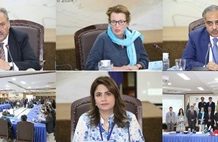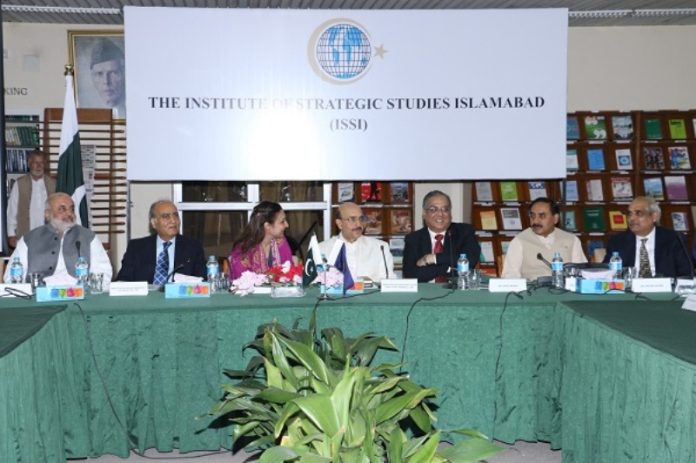Press Release
April 22, 2016
The Institute of Strategic Studies, Islamabad (ISSI) organized a roundtable discussion on “Poverty Alleviation and National Security” on April 22, 2016. Civil society representatives, government officials, members of academia and students from various universities constituted the diverse discussion panel. Ambassador Masood Khan, Director General, ISSI opened the event with his welcome remarks. He said that there is a direct correlation between poverty alleviation and national security. He emphasized that reducing the gap between the rich and poor was essential to reduce poverty within the country. He emphasized that public and private collaboration is essential for alleviating poverty in Pakistan.
The keynote speaker, Dr. Hafiz A. Pasha, a senior economist, appreciated Government of Pakistan’s efforts for prioritizing poverty alleviation. Contextualizing the link between poverty alleviation and national security in Pakistan, he said that there is a powerful link between poverty and absence of human security. He pointed that poverty makes people vulnerable to three deprivations, which includes freedom from basic want, an environment of fear and insecurity and deprivation of dignity from people’s life, which is a fundamental human right. Highlighting the major trends in poverty, Dr. Pasha said that most of the research done argues that poverty over the years has been increasing and rural poverty is higher than urban poverty, such as there are big pocket of poverty is in southern Punjab and Federally Administered Tribal Areas (FATA). He also pointed towards the growing inflation and unemployment resulting in idle youth, which then becomes the fodder for militancy.
The chief guest, Ms. Marvi Memon, MNA and Chairperson, Benazir Income Support Programme (BISP) said that there is a symbiotic nexus between poverty and insecurity in Pakistan, which can be attacked most effectively through the propagation of the rule of law and access to justice. BISP is initiating NSAR data base for tracking poverty pockets. BISP’s best payment mechanism will guard the dignity of BISP beneficiaries and e-commerce will provide an outlet to women entrepreneurs. She also said that BISP is working to promote education and has enrolled one million children of which 47% are girls. BISP is also working on providing vocational training and more than 100,000 of them have received interest free loans. She further said that with the BISP’s target of one million graduates of poverty will be the turning point and the tipping point in Pakistan’s growth journey.
Mr. Saleem Ranjha, Secretary BISP, expressing BISP’s vision said that BISP currently caters to 5.2 million families, but our goal and destiny is way ahead. Dr. Zafar Iqbal Qadir, Director and Chairman Taleem Foundation, stressed the role of education in alleviating poverty. He especially talked about the importance of tele-connectivity and emphasized how his organization is making a difference by promoting e-learning. Dr. Rashid Bajwa, CEO National Rural Support Programme (NRSP), talked about two key ingredients for poverty alleviation – targeting and access. He underlined the need for population planning in Pakistan. Dr. Abid Sulehri, Executive Director Sustainable Development Policy Institute, also talked about the importance of human security, which should be taken as a national security problem.
The presentations were followed by discussion which emphasized that we should move from poverty alleviation to poverty eradication. Pakistan has 80 million plus middle-class which can serve as an engine of growth. Pakistan should brand a positive outlook of its economy. BISP is a success and now it needs to be up-scaled, under a comprehensive strategy for fighting poverty. Poverty alleviation has to be incentivized for the private sector, with corporate social entrepreneurship.
Ambassador Masood Khan concluded that Pakistan has to build upon positives and gather data of socio-economic indicators, which will serve as a compass in guiding our social protection and poverty eradication policy. China-Pakistan Economic Corridor (CPEC) is a game changing opportunity for the people of Pakistan, creating jobs for millions and strengthening our local Small-Medium Enterprises (SMEs). He also emphasized that all prongs of national security should be strengthened: “Peace is not given to you as charity, but you have to earn it.”












